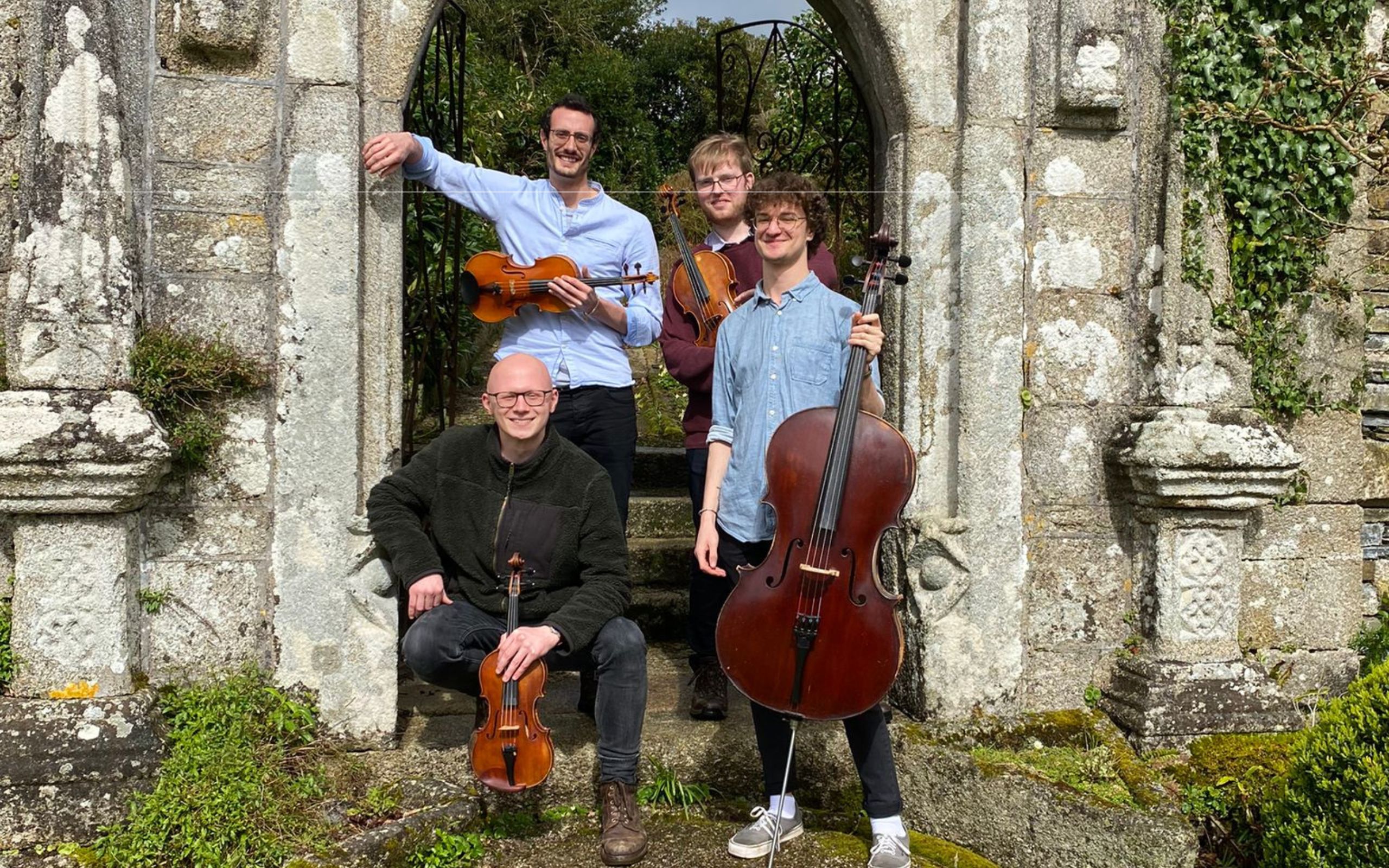Meet Alastair, Ricardo, Peter and Charlie from the Saorsa String Quartet – one of our 2 resident student quartets this summer who will be taking part in masterclasses and coaching sessions across the festival, plus their debut showcase on Sat 5 August, 2pm at Kendal Town Hall.
What has music given you?
It has given us the opportunity to do what we love everyday; including meeting new people and travelling to different places. It has also helped us develop a sense of self-identity.

Why be a musician?
It gives you a sense of freedom and development, because there is always something new to learn. You also never have the typical 9-to-5 sort of schedule with having a musical career; there is always some variety in what we do each day.
Why be in a quartet?
It’s good for your communication and listening skills. And you get the opportunity to develop a deeper understanding of the music you’re playing when learning and working regularly as a quartet.
How long has your ensemble been together?
Since 2017, initially calling ourselves the ‘Blossom Quartet’! Alastair was one of the original members.
How has your ensemble changed since then?
A year after our formation, we renamed ourselves the ‘Saorsa Quartet’ (a good choice in ‘rebranding’!). Peter joined in 2018, Charlie in 2021, and Ricardo last September.
What do you hope to learn or experience during the festival?
We are looking to expand our knowledge and skills, with the help of the amazing musicians we look up to, and to give us a better understanding of what being a professional ensemble entails.
How long do you think it takes for a chamber ensemble to gel?
It can depend on various things; not just the skill levels of each player, but even more so with each person’s different personalities. This year, Ricardo joined our quartet as our new 2nd violinist, but this was a very easy transition due to how long the rest of the quartet had been playing together, as well as already knowing Ricardo for a few years before that.
What is it about music that made you want to follow it as a career?
ALASTAIR (violin I): I enjoy the problem solving aspect of music, because that’s how my brain works! Finding a solution to a phrasing or passage that is unconventional I take a lot of enjoyment from. Exploring this in a quartet is something I find so rewarding and want to follow it into my career.
RICARDO (violin II): It was something that came naturally to me from a young age. I was a kinesthetic learner, so learning an instrument felt like a natural way of making and communicating with sound.
PETER (viola): I had constant exposure to classical music throughout my childhood, thanks to my parents, who had both learnt classical instruments (my father played the violin and studied music at university), so I grew a natural affinity for it! I also grew a love for the collective aspect of playing, initially in youth orchestras, and then with chamber groups.
CHARLIE (cello): Being born into a musical family I was also exposed to it a lot from a young age and the more I watched, played and listened to it the more I grew to love it! I also get on very well with the practical aspect of it, and found that it always came more naturally to me than most other subjects.
If you weren’t a musician, what would you be doing instead?
ALASTAIR: I would have stayed in science; probably chemistry.
RICARDO: Probably something in engineering. Or architecture!
PETER: I had faint thoughts about doing drama when I was in school, but I quickly grew disinterested with this idea around the age of 14/15!
CHARLIE: I have always loved the idea of working with animals and wildlife, or something crafty like woodwork!
Who would you say is your greatest musical influence or hero? Why?
ALASTAIR: Mikael Åkerfeldt is a particular inspiration of mine. He is the main songwriter/vocalist for the progressive/death metal band Opeth, and has written some incredible albums drawing on many musical styles, but he cannot read sheet music and has had no formal musical training.
RICARDO: The Danish String Quartet, because I love their versatility as musicians, with their mix of classical and folk playing. Their interpretations of different styles are as close to perfect as one can get!
PETER: Tricky to narrow down! My past and present viola teachers, Lucy Nolan and Louise Lansdown, have both been very inspirational. I feel an important part of where I am is down to their care and guidance they have given me over the years! Away from teachers, I’m inspired by Timothy Ridout; he makes a wonderful sound and is so expressive, but also seems very relaxed with his viola playing.
CHARLIE: My teacher, Eduardo Vassallo, and my dad. Both have had an extensive career as professional musicians and hearing about the huge variety of music, people and places they experience is inspirational and very appealing to me.
Would you say you have learnt anything from during the pandemic? Was there anything that you used to take for granted?
We have definitely come to appreciate the importance of rehearsing together in-person, with friends, and experiencing a personal connection through the music we play.
What are your fears as a musician?
ALASTAIR: My biggest musical fear would be taking it into my career and losing my passion and commitment for music. The joy of delving into music is because it is so diverse, finding a rut and stagnating in it would lead to indifference, and falling out with this wonderful art form.
RICARDO: My biggest fear as a musician is having spent so much time and energy on developing my craft with the possibility of not being able to make it my career. Money is always an issue when being a musician, especially finding a reliable source of income when so much of one’s time is spent on learning, auditioning and rehearsing.
PETER: My biggest fear is losing my motivation in the future if I don’t achieve what I want to. I’ve had very small patches of this in the past, but being in an educational environment has helped to protect me from long spells of this. I need to know how to deal with this problem once I make the full transition into building my music career.
CHARLIE: My biggest fear is not being able to make a career as a musician after putting so much into it for so long. Especially at this stage where our professional careers are just beginning, and the industry is growing more and more competitive.
What do you want to achieve as a musician or as an ensemble?
To be able to make this quartet an established part of our portfolio career.
What’s standing in your way?
ALASTAIR: I struggle from burnout and having a good working routine, but knowing how my brain works and how to combat this recently has been very good for me.
RICARDO: Personally as a musician, injury is something that has always stood in my way. I have suffered from different physical problems in my left arm, and it prevents me from practising as much as I would like, and makes long rehearsals and concerts very difficult, as they take a toll on my physical and mental health.
PETER: Having autism has affected my whole life, and therefore it can be an obstacle as a musician. This includes – but not limited to – needing more time to process new or large quantities of information; having difficulty adjusting to sudden changes; and finding it difficult to socialise with new people. But thanks to the right help, the personal motivation to push myself, and learning to adapt to each new scenario I face, all these issues have improved (often other people don’t even notice) and I have a better understanding how to deal with them.
CHARLIE: Performance anxiety has been my biggest obstacle in recent years. Although it is much better now, it still limits what I can do as a performer and I worry that it always will.


0 Comments